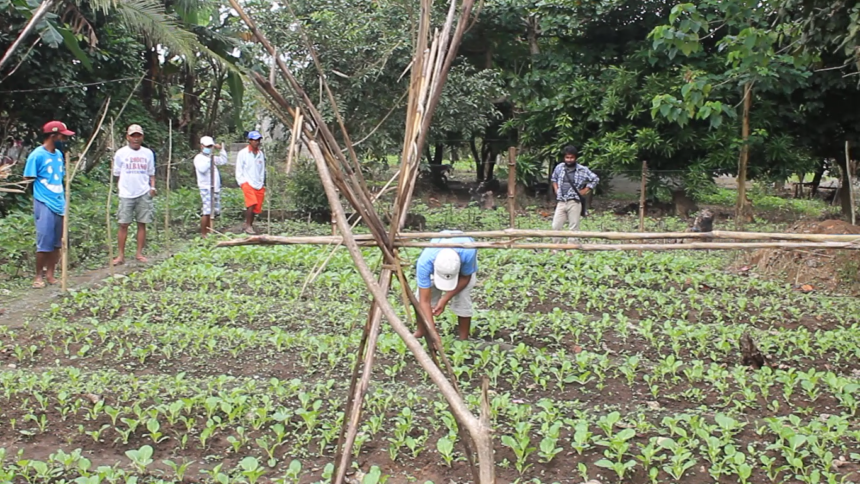Hope in the face of Disasters: Nenita’s Story
Brgy. Lalauanan, Tumauini, Isabela – Nenita is a 56-year-old mother to ten children and a farmer in a remote community in the Municipality of Tumauini, located in the province of Isabela. The area is blessed with rich and fertile agricultural lands, but the farming families still experience hunger and food insecurity. Nenita’s husband is also a farmer, both having ardently work on their farmland to provide the needs of their children. On the days she is not working in the farm, she is in the market selling the vegetables they harvested. Even though she is aware of the threat of COVID-19 to her health, she is more concerned about what her family will eat on a daily basis, so she continues to sell vegetables to nearby houses or at the local market to earn an income. However, she makes less than half of what she used to because of the lockdown and the flooding that happened last October 2020 which made their dire situation even worse.
While coping with the repercussions of the pandemic, Nenita and her family had to face another disaster. Unbeknownst to them, another catastrophe was on its way in the form of a devastating typhoon. This time, it was accompanied by severe flooding that resulted in the massive destruction of farmlands, irrigation pumps, houses, and crops. It also caused the displacement of many individuals whose houses were submerged in the water.
Nenita gets emotional and her voice trails when she remembers how she nearly lost everything to the flood. It swept away the ready-to-harvest crops in Nenita’s little farmland, their crops which are an integral part of their lives. “It was incredibly tough for all of us.” She said that when the water subsides, she and her husband could resume their farm work. However, it will be difficult for them to start again as they will have to look for other sources of capital to buy seeds and other basic planting needs.
Despite these blows, Nenita remained resilient, confident in the fact that there are numerous women who have her back.
(Sa likod niya ay ang mga kababaihang kasing lakas ng hanging-amihan.)
Extra-ordinary Women of Amihan
Aside from being a mother and wife, Nenita is also a leader of the progressive peasant women’s group called Amihan. It is an organization made up of women farmers that aims to uphold women’s rights. “We organize to expand our organization and we work hand-in-hand on activities such as gardening and helping those in need” Nenita says. Aside from typhoons, climate disasters, and the Covid-19 pandemic, the peasant women are also faced with the dangers of red-tagging which endangers their lives and subjects them to harassment and threats from state security forces. Nenita is indeed an extraordinary woman, her determination and personal struggles have made her fit to lead this organization in their community. Her co-villagers count on her courage. Nevertheless, Nenita never backs down. She is always ready to fight for what is right.
Despite the malicious attacks linking Amihan to communist groups, these women remained true to their mission to help others. Aside from encouraging women to stand up for their rights and to fight for change, their group also helps those affected by the disasters in their community. However, this time, Nenita and her companions shared the same boat and face the same fate. They have already been badly hit by the pandemic that prohibits them to transport their produce and access markets, with a series of devastating typhoons that adds an extra layer has led to rising poverty and hunger in their communities. This has further decreased the purchasing power of the most vulnerable people, so, many of them are unable to meet their basic needs.
Hope Sprouts Again
To respond to the communities’ urgent needs, the Citizens’ Disaster Response Center (CDRC) through the funding assistance of the World Jewish Relief (WJR), distributed agricultural support to the affected areas in Isabela and prevent the most vulnerable families from further sinking into hunger.
When CDRC reached Aling Nenita’s community, she was one of those who received immediate assistance from the organization. You can see the delight in her face as she lined up in the distribution site. Due to this project, she was given short-cycle vegetable seeds that she planted in her garden where she grows mustards, radish, string beans, and pechay, which means she no longer needs to buy these from the market. She is not only providing nutritious food for her family, alongside the staple foods they had been eating, she was also able to share some of her produce with her neighbours and sold the surplus at the local market to gain a profit. She also received agricultural tools that helped her farm more efficiently and sacks of fertilizers that makes her garden very fruitful. Nenita said that she is very thankful to be able to harvest vegetables from her backyard. This makes life easier because everything she need to start again was already provided.
What used to be an idle piece of land that served as a community park was converted into an integrated mini vegetable garden that has been serving villagers baskets of fresh vegetables to sustain supplementary feeding within the community.
As Nenita gradually sees their planted seeds sprouting, her hope began to rise again. The agricultural assistance not only guaranteed a future harvest of nutritious food, but helped restore their hope in the midst of subsequent crises.

